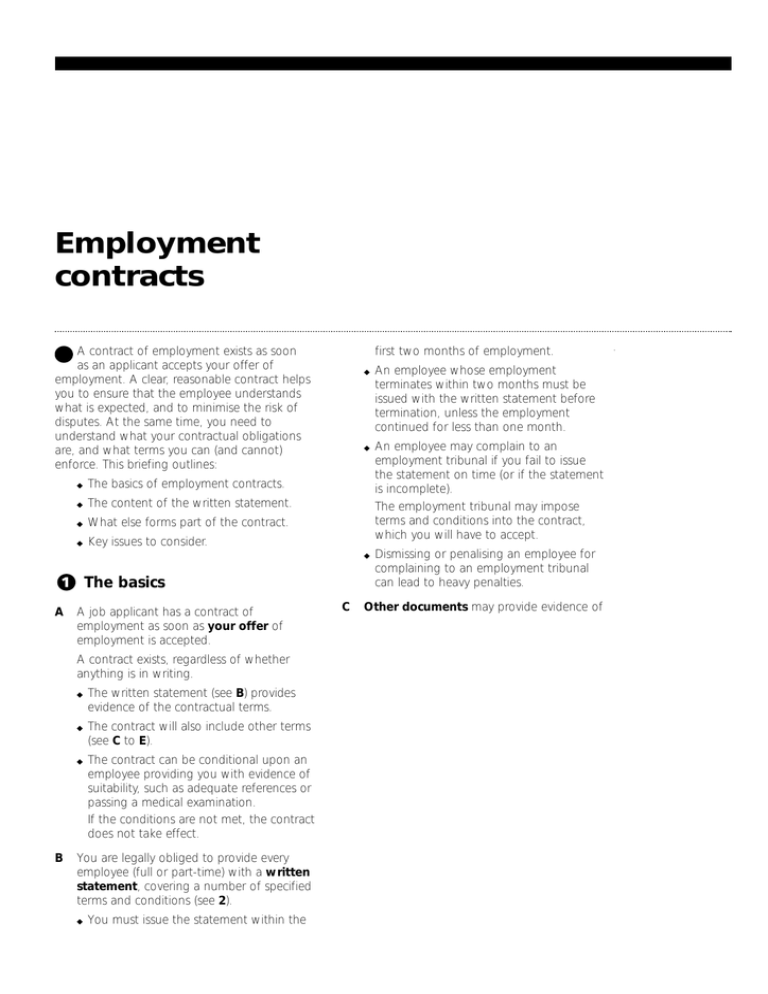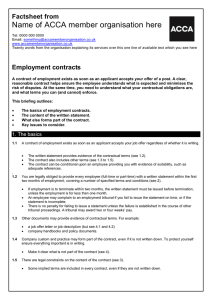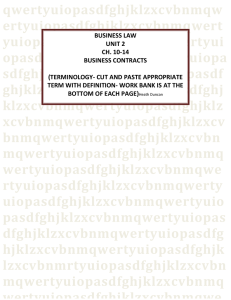Employment contracts
advertisement

Employment contracts A contract of employment exists as soon as an applicant accepts your offer of employment. A clear, reasonable contract helps you to ensure that the employee understands what is expected, and to minimise the risk of disputes. At the same time, you need to understand what your contractual obligations are, and what terms you can (and cannot) enforce. This briefing outlines: ◆ The basics of employment contracts. ◆ The content of the written statement. ◆ What else forms part of the contract. ◆ Key issues to consider. first two months of employment. The basics A A job applicant has a contract of employment as soon as your offer of employment is accepted. A contract exists, regardless of whether anything is in writing. B ◆ The written statement (see B) provides evidence of the contractual terms. ◆ The contract will also include other terms (see C to E). ◆ The contract can be conditional upon an employee providing you with evidence of suitability, such as adequate references or passing a medical examination. If the conditions are not met, the contract does not take effect. You are legally obliged to provide every employee (full or part-time) with a written statement, covering a number of specified terms and conditions (see 2). ◆ You must issue the statement within the C ◆ An employee whose employment terminates within two months must be issued with the written statement before termination, unless the employment continued for less than one month. ◆ An employee may complain to an employment tribunal if you fail to issue the statement on time (or if the statement is incomplete). The employment tribunal may impose terms and conditions into the contract, which you will have to accept. ◆ Dismissing or penalising an employee for complaining to an employment tribunal can lead to heavy penalties. Other documents may provide evidence of contractual terms. For example: ◆ ◆ A job offer letter or job description (but see 4A and 4B). Company handbooks and policy documents. D Custom and practice in your company may form part of the contract, even if it is not written down. The easiest way to protect yourself is to ensure that everything important is in writing. ◆ E You can provide a single written statement covering all the terms; or a ‘principal statement’ (see A), together with further instalments covering the other specified terms and conditions (see B–D). The statement must cover all the specified terms and conditions, even if they do not apply. A The principal statement must contain: Make it clear what is not part of the contract (see 4). There are legal constraints on what is (or cannot be) in the contract (see 3). ◆ ◆ F Written statement Some implied terms are included in every contract, even though they may not be written down. ◆ The names of the employer and employee. ◆ The date when the employment began. ◆ The date on which the employee’s period of continuous employment began. This may include previous employment with a related employer. ◆ The employee’s scale or rate of pay (or how it is calculated) and the intervals at which wages or salary will be paid. ◆ Information about working hours (starting and finishing times, system of shifts, night work, meal breaks, rest days, overtime and overtime payments, etc). ◆ Entitlement to annual holidays (including bank and public holidays) and holiday pay. This must provide enough information to work out the employee’s entitlement to accrued holidays and holiday pay on the termination of employment. ◆ The employee’s job title (or a brief description of the work for which the person was employed). ◆ The employee’s place of work. If the employee is either required or permitted to work in various places, the statement should include an indication to that effect and a note of the employer’s address. Contracts cannot override certain statutory rights. You cannot change the employment contract unilaterally. ◆ ◆ ◆ Consult employees and get their agreement before making fundamental changes to their terms and conditions. Altering terms and conditions without the employee’s consent is a breach of contract. This could lead to a complaint of constructive dismissal (unless the change is one that is clearly advantageous to the employee, such as a pay rise). If you wish to change any of the particulars in the written statement, you must notify the employee in writing. This must be done within a month of the date when the change takes effect. Working abroad If an employee will be required to work outside the UK for more than one month, the written statement must also include: A How long the employee will be required to work outside the UK. B C In what currency the employee is to be paid while abroad. B The principal statement or some other readily accessible documents must also include: ◆ Any terms and conditions relating to incapacity for work due to sickness or injury, including any provision for sick pay (other than statutory sick pay). ◆ Any terms and conditions relating to pensions and pension schemes, including whether the pension scheme is ‘contracted out’. ◆ The length of notice which the employee is obliged to give and entitled to receive to terminate the contract of employment. ◆ The intended period of employment or the date when it will end (unless permanent). ◆ Any collective agreements which directly What additional remuneration or benefits (if any) will be paid or provided. D Any terms and conditions relating to the employee’s return to the UK. The employee must be given the written statement before leaving the UK, if the employee is due to leave the UK within two months of starting work. page 2 affect the terms and conditions of the employee’s employment. ◆ C ◆ Information on grievances (see C) and discipline (see D). The statement must include a note on your grievance procedure, including: ◆ The individual (by name or job title) to contact with any employment grievance, and how to do so. ◆ What further steps (if any) will follow. D The statement must also include a note on disciplinary rules, including: ◆ What the rules are. ◆ Who to complain to if dissatisfied with a disciplinary decision, and how to do so. ◆ What further steps (if any) will follow (eg an appeals procedure). Contractual terms which attempt to override these rights may be void and unenforceable. In addition, various laws restrict who you can employ. For example, there are restrictions on employing children. If you are in any doubt, ask your legal adviser. Non-contractual terms Include a written statement of terms and conditions with your letter of employment, to clear up any possible misunderstandings. A Any job offer can become a contractual obligation. Minimum standards on discipline and grievance procedures will be implied into all employment contracts from October 2004. See Discipline and grievance issues, HR 18. B Other contractual terms ◆ Make it clear at any interview that you are not offering a job at that stage. ◆ Ensure that any job offer letter states that the contract will be governed by written terms and conditions to be provided later. Provide job descriptions which allow you the maximum flexibility. ◆ Include a statement that you reserve the right to amend or add to job descriptions. For example, to accommodate any restructuring of the business, changes in working methods, advances in technology, introduction of shift working, and so on. ◆ Reserve the right to change the employee’s place of work. If you do not, you may be in breach of contract if the business is relocated and you try to get employees to move to new premises. Even if you do this, an employee may still claim a ‘place of work’ redundancy. Every contract includes implied terms, whether they are written down or not (see A and B). In addition, no contract can override certain statutory rights (see C). A Employers must: B C ◆ Provide a secure, safe and healthy working environment. This includes providing safe working methods and appropriate health and safety training. ◆ Not take any action which may undermine the relationship of ‘trust and confidence’ with their employees. Employees must: ◆ Serve the employer honestly and faithfully. ◆ Not compete with the employer’s business. ◆ Not divulge confidential information (but see 5G). ◆ Obey reasonable and lawful instructions. ◆ Work with due diligence, skill and care. Employees’ statutory rights include: ◆ A minimum period of notice (see Dismissing employees, HR 5). ◆ Rights under anti-discrimination laws (see Discrimination, HR 24). ◆ The right to be, or not to be, a member of any particular trade union. Rights under legislation relating to working time and pay (see Working time and the minimum wage, HR 25). C Make it clear if you intend benefits to be non-contractual (and therefore easier to amend or withdraw). Typical examples include discretionary bonuses, private health insurance or the option to dress down on Fridays. ◆ Identify them as ‘non-contractual benefits’ in the written statement. Explicitly state that you reserve the right to alter or withdraw them. ◆ If employees come to have ‘reasonable’ expectations of receiving a benefit, an employment tribunal or court is likely to interpret it as a contractual entitlement. For example, if you always pay a 10 per cent Christmas bonus, make it clear under what circumstances it will be paid. page 3 ◆ It is good practice to give reasonable notice of your intention to withdraw or alter any benefits, and to discuss your plans with employees. orientation, religion or philosophical belief, or between part-time and full-time employees. This applies whether they are contractual or non-contractual. D Give yourself some flexibility on disciplinary rules and procedures. ◆ Some minimum procedures will become contractual from October 2004 (see 2). Stress that procedures in excess of these minima are non-contractual and nonexhaustive. A There are legal restrictions on working hours. ◆ There are detailed regulations regarding minimum daily rest periods, rest breaks, minimum weekly rest periods, maximum weekly hours, paid holidays and health assessments for night workers. These regulations are complex and you should take legal advice if you have particular concerns on these points. The terms and conditions on which they are provided should be spelt out clearly and unequivocally. ◆ Even discretionary payments can lead to a claim of unlawful discrimination. See Remuneration, HR 26, and Discrimination, HR 24. F Common issues ◆ The employer normally owns the rights to any intellectual property created by an employee in the course of employment. This should be written into the contract. For example, the rights to any inventions, designs or publications. G Confidentiality clauses should be included in the contracts of directors and other senior employees with access to sensitive information. ◆ See Working time and the minimum wage, HR 25. B Entitlement to annual holiday must be set out in the written statement. ◆ C Employees are entitled to a minimum of four weeks’ paid annual leave. ◆ Make sure the contract clearly states the grounds on which you can terminate the employee’s employment without notice or with a payment in lieu of notice. For example, in cases of gross misconduct such as theft or jeopardising the health and safety of others. Persistent failure to perform duties to a reasonable standard may be another reason, but you must have followed a fair performance procedure. See Dismissing employees, HR 5, and Employment tribunals, HR 21. E H Preventing an ex-employee from competing with you is difficult. ◆ In order to prevent an ex-employee from setting up in business as a competitor, express terms will need to be included in the contract. To be valid, any such restriction must only be for a specified period, and must only cover a specified geographical area. ◆ You may also want to include restrictions preventing ex-employees from targeting your customers or recruiting senior staff. ◆ If challenged, it will be up to you to prove that restrictions go no further than is necessary to protect your legitimate business interests. In general, you are not entitled to make deductions from an employee’s pay packet unless you have a prior written arrangement or you are required to do so by law (eg PAYE and National Insurance). D Dismissing an employee may give rise to a claim for unfair dismissal or breach of contract or both. Employees are under an implied duty not to divulge trade secrets, both during employment and after it has ended. Set out clearly what you consider to be confidential in the written employment contract. You will not be able to enforce any ‘posttermination clauses’ if you are in breach of contract. Consider taking legal advice if you are considering amending your employment contracts before October 2004, or have any specific concerns that need to be covered in them. Benefits must be provided on a basis that does not discriminate, either directly or indirectly, between employees on the grounds of sex, race, disability, sexual page 4






